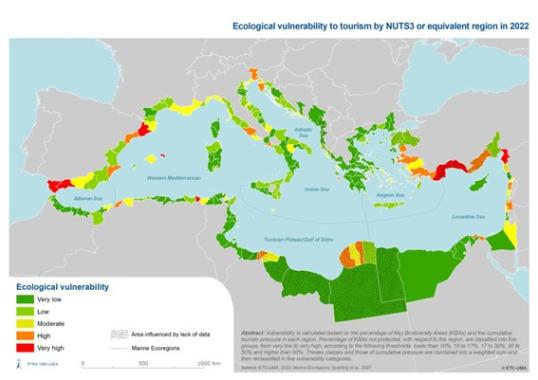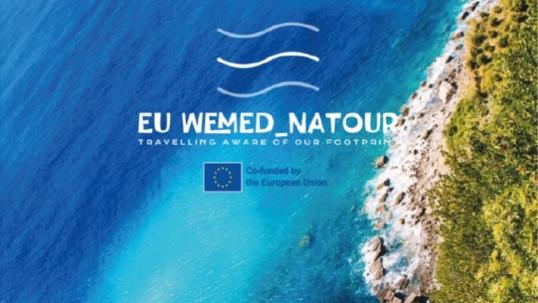
The popularity of the Mediterranean Sea and its coastal regions amongst tourists remains at an all-time high. After a temporary covid dip, the latest figures show that numbers of tourists have already reached pre-pandemic levels and are further on the rise. But this puts significant pressure on the environment of the region.
This is why the WestMED Initiative launched a new Technical Group on Sustainable Tourism, which will serve as a forum to discuss trends and opportunities for sustainable tourism in the area. The group will provide support to participants to develop project ideas around the EU priorities for tourism: green transition, digitalisation, promotion of social inclusion, governance, and skills.
Counting with non-EU members under the WestMED Initiative, this technical group will also focus on addressing other policy and regulation topics that can help non-EU countries develop these sustainable tourism practices.
Promising proposals for sustainable tourism were the focus of WestMED Hackathon in Faro (Portugal) on 3 October.
A traditional model which is no longer viable
Traditional ‘sun, sea and sand’ tourism has resulted in improved livelihoods for many local communities, averaging 11.5% of total employment in Mediterranean countries. So, it is one of the leading economic sectors in the region.
At the same time, the numbers also put tremendous pressure on the environment. Mass tourism is one of the main causes of increased pollution and a driver for wide-spread construction along the coastlines. This, coupled with a growing demand for water, food and energy and the rising temperatures (sea and land), severely impacts the region’s resources, and is therefore not viable in the long run.
Additionally, these same pressures might, in the medium-long term, have the paradoxical effect of lowering the attractiveness of tourist destinations in the Mediterranean.
Sustainable blue economy at the heart
The European Commission is actively addressing many of these issues to safeguard the connection between economic welfare and the environment with the ‘Sustainable blue economy’ agenda.
This has been an ongoing process since 2013 – as part of the Commission’s targeted approach for several European sea basins with dedicated blue strategies for the Atlantic (Atlantic Action Plan), the Black Sea (Common Maritime Agenda) and the Western Mediterranean (WestMED Initiative).
For the Western Mediterranean, the main objective was to “strengthen the competitiveness and sustainability of the coastal and maritime tourism sector, within a smart and resilient blue economy”, as stated in the WestMED Malta Ministerial Declaration (2023). This would be achieved by preserving the marine and coastal environment as well as marine cultural heritage and contributing to the attractiveness of coastal areas with ecotourism, digitalisation and private-public investments.
A call for experts for the technical group on sustainable tourism in WestMED was launched in June 2024. More than 80 experts signed up to co-develop project ideas and steer the discussion.
The official launch of the technical group will take place at the Sun&Blue Congress (20-22 November 2024, Almeria, Spain) during a WestMED Side Event.
Ecotourism packages and smart sustainability platform discussed at the WestMED Hackathon
The WestMED Hackathon in October focussed on joint project development and provided a unique opportunity to collaborate with like-minded innovators, industry leaders, and experts from across the Mediterranean region. The Hackathon takes place every two years.
From a list of topics of interest, two main ideas were selected and further worked on by participants.
The first idea involved capitalising on the results of the EU WEMED NATOUR project, which involves SMEs in the West Mediterranean to create ecotourism packages for schools, protecting marine ecosystems and cultural heritage. The aim would be to expand it to other geographical contexts and target groups.
The second most voted idea was the development of a SMART Sustainability Platform. This platform should seek to advance on indicators and ways to measure the impact that the use of technologies could have on changing people’s behaviours, on new tourism demand and the development of new sustainable business activities.
Other promising project ideas in sustainable tourism were discussed: Eco-islands; Reduction of plastics/waste; Development of technological applications for tourism purposes (ex. identification of species, plastic...); Technological applications for ocean literacy and citizen science ; Awareness and knowledge sharing; Governance; Development of strategies (private and public) – Flagship initiatives; Network of nautical stations; Planning (coastal tourism and inland tourism) – creating innovative products; Ecosystems of smart tourist – development of indicators and standards; maritime-tourism, pesca-tourism, regenerative tourism and many others.
The two main project ideas will try to turn into concrete initiatives with the help of EU funding, so stay tuned for more updates on the WestMED Initiative website!
Details
- Publication date
- 11 October 2024
- Author
- European Climate, Infrastructure and Environment Executive Agency


